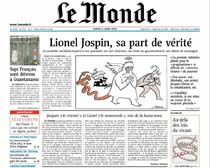
Geneva, Switzerland
info@astonesthrow.ch

French National Dailies: Severe Hemorrhaging Worsening, Cardiac Arrest Nears for Some
If anyone was ever in doubt that newspapers that fail to satisfy their readers will lose them, then look no further than France.
The most recent year-on-year circulation numbers for the
French national newspapers are dismal with France-Soir leading the
decline with a 13.7% drop. At
Le Monde, one of t he world’s most prestigious titles and
considered France’s newspaper of record, circulation dropped 10.5% and
management announced plans for a 12% reduction in staff (90 to be fired).
At Le Figaro, the voice of the French upper middle class,
circulation dropped a comparatively modest 3.9%, but the financials were
so bleak that Robert Hersant,
who had bought the paper only in
1975, sold it to Serge Dassault, head of the Dassault aviation empire.
Dassault has his own ideas on what should and should not be reported about
French business interests causing even more public uproar at the
newspaper. This week he appointed a new editor-in-chief.
he world’s most prestigious titles and
considered France’s newspaper of record, circulation dropped 10.5% and
management announced plans for a 12% reduction in staff (90 to be fired).
At Le Figaro, the voice of the French upper middle class,
circulation dropped a comparatively modest 3.9%, but the financials were
so bleak that Robert Hersant,
who had bought the paper only in
1975, sold it to Serge Dassault, head of the Dassault aviation empire.
Dassault has his own ideas on what should and should not be reported about
French business interests causing even more public uproar at the
newspaper. This week he appointed a new editor-in-chief.
It is not that the French don’t like to read; it’s that newspapers are not their favorite traditional read – magazines are. France has the world’s highest magazine readership per 1,000 inhabitants with eight times more magazine readers than newspaper readers. And while the country suffers one of Europe’s lowest newspaper readership, the provincial newspapers are holding their own – it is the national newspapers that are in the most trouble.
L'EQUIPE DOING WELL
But if the product is right the French will buy. L’Equipe, one of the world’s most outstanding daily sports newspapers, had European football tournaments and the Olympic Games to concentrate on and saw its circulation grow by 11.8%. Les Echos, a financial newspaper, saw a slight circulation increase. So what they do that the other national dailies don’t? The common sense answer is they concentrate on what they do best and give their readers what they want.
There is a suspicion that
the nationals have lost touch with their readership. For Parisians the
nationals are an interesting read, but if you live outside of Paris you co uld seriously question whether the paper was for you. That could be one
reason why provincial newspapers are doing rather well.
uld seriously question whether the paper was for you. That could be one
reason why provincial newspapers are doing rather well.
Also the nationals must exist with the least efficient distribution system in Europe. Most nationals have a deadline for their first editions destined for the provinces of around 4 p.m. with possible exceptions for late-breaking bulletins. So the football game that night may not be in the provincial edition of the national while it will be in the local provincial newspaper. Which would you buy?
The French advertising market is still very sluggish so if it were not for substantial French government subsidies the very existence of many national publications would be in doubt. Subsidies take various forms from 50% reductions in communication charges, to cut-price mail delivery, cut-price travel, providing partial building funds, keeping newsprint costs low, 0 corporation tax if the money is reinvested within five years and 0 VAT. It even keeps the news agency AFP in business via very substantial government contracts, thus providing for a low cost national news agency.
SHOULD SUBSIDIES CONTINUE?
The economists might say “No bad thing”, but it was Napoleon who opined, “Four hostile newspapers are more to be feared than a thousand bayonets!” Another problem with the nationals today is that if Napoleon was in power he would not fear them.
With such subsidies in their hands, the national
newspapers are loathe to criticize the government. Last year the daily La
Croix fired a reporter who wrote a book severely criticizing the
French media for following as a matter of policy the lead of the French
government in opposing the US-led coalition invasion of Iraq.
Publishers also must deal with very strong labor unions. The unions have not been “broken” as they were by Rupert Murdoch in the UK. They often decide, by walkout threats, what work practices, if any, may be changed and how. When AFP, which loses substantial amounts each year, tried to modernize itself and become profit-oriented a few years ago the unions simply would not allow it and the plan never saw the light of day.

The French buy Paris Match all over France. It is strong on pictures, strong on sex, scandal and sports and sold at the same kiosks that sell the newspapers. The public knows what it wants and buys it in droves.
Now if only the French had a national that severely criticized the government when it had it coming, and had a good dose of sex, scandals and sports.
Could The Sun ever shine in Paris?
© Philip M. Stone of Stone & Associates, a partner in followthemedia.com